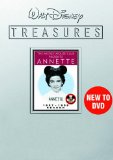| Reviews & Columns |
|
Reviews DVD TV on DVD Blu-ray 4K UHD International DVDs In Theaters Reviews by Studio Video Games Features Collector Series DVDs Easter Egg Database Interviews DVD Talk Radio Feature Articles Columns Anime Talk DVD Savant Horror DVDs The M.O.D. Squad Art House HD Talk Silent DVD
|
DVD Talk Forum |
|
|
| Resources |
|
DVD Price Search Customer Service #'s RCE Info Links |
|
Columns
|
|
|
Walt Disney Treasures: The Mickey Mouse Club Presents Annette - 1957-1958 Season
Walt Disney continues with their superlative Walt Disney Treasures tinned box sets with The Mickey Mouse Club Presents: Annette 1957-1958 Season, a two-disc set which includes the 20-part serial, Annette (starring that most famous of Mouseketeers, Annette Funicello), two full episodes of The Mickey Mouse Club (the episodes that began and ended the serial), as well as two short featurettes on the beloved Disney star. While not as bonus-loaded as I would have liked, The Mickey Mouse Club Presents: Annette 1957-1958 Season does give us a fascinating look at what passed for juvenile entertainment back in those more innocent TV days - entertainment that can still grab a modern audience's attention today.

During the third and final season of Walt Disney's syndicated smash hit, The Mickey Mouse Club, the hour-long format was cut back to one-half hour. In addition to the standard musical and dance numbers and skits that were a hallmark of The Mickey Mouse Club, daily serials continued to be showcased; in this final season, four debuted, with Annette, starring the only Mouseketeer Walt personally hand-picked for the job, Annette Funicello, debuting on February 11th, 1958, and running until March 7th, 1958. Based on author Janet Sebring Lowrey's 1950 juvenile novel, Margaret, Annette told of a small-town farmgirl's trials and tribulations when she moves to a bigger city to live with her aunt and uncle. Adapted by prolific Hollywood screenwriter Lillie Hayward (My Friend Flicka, Smoky, Blood on the Moon, Tonka), and directed by the expert helmer of numerous Abbott & Costello and Ma & Pa Kettle comedies, Charles Lamont, Annette would be the first project to headline Walt's breakout Mouseketeer performer, launching her singing career, as well, when the adorable Annette crooned, How Will I Know My Love?, on one of the episodes.
Set in the present-day (1958) fictional city of Ashford, somewhere west of Nebraska (since Annette is corrected that farms are called "ranches" out this way), Annette tells the story of orphaned teenager Annette McCleod (Annette Funicello), who travels from her farm in Beaver Junction, Nebraska, to Ashford. Sent by her "adopted" mother (who cared for Annette when her real mother died) to live with Annette's uncle and aunt, Annette arrives at the McCleod house the same day her guardian's letter arrives, explaining the situation. Uncle Archie McCleod (Richard Deacon), a stuffy philosophy teacher working on a new thesis, clearly doesn't want Annette to stay in his quiet, orderly home, but his sister, Lila (Sylvia Fields), feels sorry for their niece, and urges Archie to let her stay - a sentiment echoed by wisecracking "regular Joe" maid, Katie (Mary Wickes), who feels the arrival of youthful Annette is just what the stuffy McCleod household needs to kick it out of its rut.
Ultimately abandoning his idea of sending Annette off to boarding school (due to the strong objections of Lila and Katie, as well as the obvious disappointment by Annette), Annette is enrolled in Old South High School, where she makes friends with both sides of the Ashford teen social set. Tomboy Jet Maypen (Judy Nugent), who delivers the McCleod's eggs and chickens every week, lives on a ranch on the outskirts of Ashford, and immediately connects with fellow farmgirl Annette. Senior Mike Martin (David Stollery), another hard-working ranch kid who soda jerks at the local malt shop, quickly befriends Annette, as well. From the tonier side of Ashford, Annette meets dreamboat Steven Abernathy (Tim Considine), a nice kid with a sweet hotrod (named Oscar) and a witch for a girlfriend named Laura Rogan (Roberta Shore), who happens to be staying in Ashford for the year. Laura, not liking at all the effect the poor but sweet Annette has on her boyfriend, Steven, takes every opportunity to slyly insult the "country bumpkin," culminating in an outright accusation of theft when Laura's bracelet (taken off during a criminally innocent game of "Spin the Bottle") goes missing - with poor newcomer Annette immediate the target of her (but not the rest of the good-natured gang's) suspicion. Negotiating your teen years are hard enough under the best of circumstances, but displaced Annette, shy (but not ashamed) about her upbringing, her manners, her lack of money and her social position, must not only succeed on her own terms with two sets of friends from different backgrounds, but she must also navigate the equally daunting, choppy waters of teen romance.
SPOILERS ALERT!
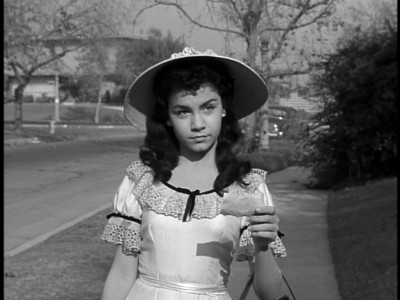
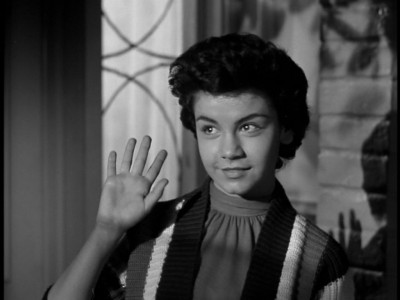
Something akin to a teen amalgamation of Peyton Place (without the sex, of course) and Pollyana, Annette is a fascinating little slice of late 1950s sociology, Disney-style, that kept not only myself entertained, but also a couple of my younger kids, as well - kids who, we're so often told by today's TV producers, supposedly won't sit still through five minutes of this kind of prehistoric, black and white "cornball" programming. It's not only the obvious serial appeal of these little ten-minute cliffhangers that makes Annette work (my littlest kids kept asking, "What's going to happen next?"), but also the solid (and timeless) thematic underpinnings that propel the story and characters along; namely: the conflicts of class status and wealth that permeate so much of American drama.
Working like a subtextual primer on late fifties anxieties about social status versus individual identity, Annette's entire thematic core is concerned with our anxiety over whether or not Annette will be "accepted" by the Ashford teen "in" crowd, and more importantly, if she'll be able to accomplish this difficult task on her own terms, without rejecting her own cultural identity. Costumed like something out of a road company tour of Oklahoma!, and walking down the plush streets of Ashford, searching for her uncle's address, poor farm girl Annette literally bumps into the epitome of American suburban success: teen dreamboat Steve Abernathy, who's backing up, admiring his expensive hot rod Oscar. This clash between cultures, between country and city, between the moneyed and the poor, between the socially "acceptables" and the acknowledged "underclass," doesn't get any more subtle in Annette than this accidental bumping-into by the two lead characters, but that very blatantness is part of the charm and economical grace of Annette's screenplay and direction.
Annette's creators assumed that its young audience of The Mickey Mouse Club enthusiasts were savvy enough to understand the ins and outs of social hierarchy among American teens, and they play straight to that understanding. All of the kids in Annette understand perfectly where they fit in as to their place in Ashford society. Annette is more than aware that she's an outsider, acknowledging her less-than-adequate rural schooling (she already assumes she'll be held back a grade at Old South High), as well as her reduced circumstances (she only has one dress) and her lack of training in the "finer" elements of social intercourse. Ranchgirl Jet understands her place, as well, telling Annette she's not a part of Steve and Laura's set, and that she probably never will be (Jet's place within the McCleod household - that of a junior tradesman, of sort - is well established, as well: when she invites herself over for dinner, she tells Annette she's never been past the McCleod kitchen). Laura certainly identifies Annette right from the start, teasing Steve that Annette is Steve's "country cousin," before she mercilessly persecutes Annette for the imagined theft of her bracelet - all because Annette is poor and outside the group. Even Aunt Lila views Annette from an insider's vantage point, noting and correcting Annette's less-than-Emily Post-perfect table manners (gad - she uses the wrong spoon to eat her grapefruit!), and openly frowning on Annette's growing friendship with rowdy Jet, telling Annette that Jet's friendship is not to Annette's "advantage." All the kids at home watching Annette back in 1958 knew just what Aunt Lila meant, even if they couldn't articulate that discrimination concretely.
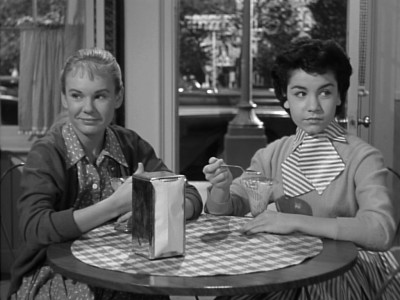
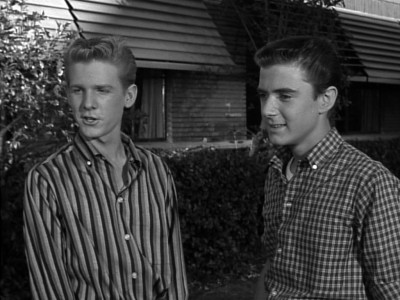
But as with many Disney productions from this period, a celebration of traditional rural values doesn't necessarily mean a condemnation of city and suburban folk (after all: they were the ones coming to Disneyland and buying all those Disney records, books, and ticket stubs). Annette is careful not to label any of the kids who are excluding Annette, as "bad eggs." Often, the other kids of the teen social set are heard offering support for Annette (particularly after she's accused of stealing), with Steve (a classic 1950s egalitarian, moderator character) openly supporting Annette even after the big fight at the Abernathy barbecue, when Annette worries that she's ruined the entire day by just being there. While hotshot jivester Olmstead "Steady" Ware (Rudy Lee) causally acknowledges that nice guy soda jerk Mike isn't in their set, he's not mean about it, and more importantly, he adds that hard-working Mike could be in their group, if he only had enough free time to hang out with them (an economic reality the other obviously well-heeled members of Steve's group don't have to consider).
It's only mean-spirited, jealous, solitary instigators like Laura, or well-meaning but misguided, stuck-in-their-ways social jockeys like Aunt Lila, who keep the classes apart. Archie, who's set up in the story to be the big villain, the big stick-in-the-mud obstacle for Annette's social ascension (he's a professional philosopher, for god's sake), quickly turns into Annette's biggest supporter. Her presence in the house (he states that she's made the house "young" again) has reawakened Archie's own connection with his past life, when he was a sportsman and hunter, and when he regularly palled around with Jim Maypen (Irving Bacon), Jet's father. When Annette receives an invitation to spend a Saturday with Jet at her ranch, Archie comes along as well, and reconnects with his friend and with a lifestyle - rural, poor, but honest and hardworking - that he openly defends the evening before at the dinner table. Archie's conversion from stuffy intellectual to reconnected pioneer (he approves of Jet's fighting, and he talks of how his ancestors founded the town with Maypen's, and that the Maypens were right to stay outside of the town) perfectly illustrates Disney's desire to view both town and country ways as worthy of admiration - particularly when they were integrated.
Other recognizable Disney thematic elements such as the benefits of hard work and facing one's challenges head-on are emphasized in Annette, but never at the expense of keeping the story moving - or in failing to entertain the viewer. Lamont, working in a razor-sharp, cut-to-the-bone visual style, keeps things hopping here (he has to, with only ten minutes per episode), and his years of directing comedy come in handy with lots of little bits of business thrown in to keep the actors occupied (Mary Wickes and Richard Deacon get the best gags). And more importantly, Lamont extracts a winning performance from Funicello. The epitome of the true '50s "girl next door" (not at all glamorous; exceedingly polite and sweet), the young Funicello may be processed here, at the beginning of her starring career, as possibly too good to be true (I like her more when she's a little older and a little naughtier - as well as funnier - in her AIP Beach Party pictures), but there's no denying that she has that indefinable "X factor" that makes a star, a star. It's an honesty to her performance, a connection with the audience on a very basic level, and she has it, right at the start of her career.
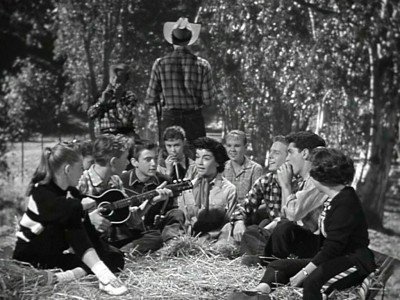
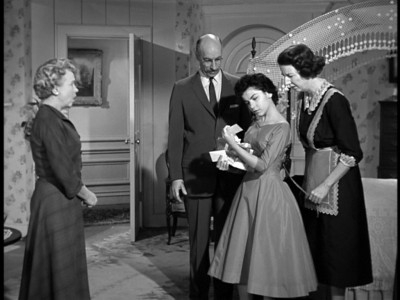
The DVD:
The Video:
The full-screen, 1.33:1 black and white transfer for The Mickey Mouse Club Presents: Annette 1957-1958 Season looks quite nice, with a varied, creamy gray scale, relatively few if any screen anomalies, and a sharpish picture. I saw no compression issues (the video sections of the bonus features vary in image quality, depending on their age).
The Audio:
The Dolby Digital English mono audio track accurately reflects the original broadcast presentation. Hiss is kept to a minimum, and dialogue is cleanly delineated. Subtitles are available for the main feature, but not for the extras.
The Extras:
Here's where The Mickey Mouse Club Presents: Annette 1957-1958 Season disappointed me. In addition to the complete Annette serial, we're presented with Musically Yours, Annette, a 1993 promo produced by Disney Records that celebrates Annette's recording career. Running 12:00, the featurette includes snippets of interviews with Annette, Tutti Camorata (her musical producer), Fabian, Paul Anka, Frankie Avalon, songwriters Richard and Robert Sherman, and best friend Shelley Fabares. As well, on Disc One, we get the entire episode from The Mickey Mouse Club that premiered the Annette serial on February 11th, 1958.
On Disc Two, we have the entire episode of The Mickey Mouse Club that concluded the Annette serial on March 7th, 1958, as well as a new featurette, To Annette, With Love, with Fabares, Sharon Baird, Richard Sherman, Glen Holt (Annette's husband), Virginia Funicello (from a 1985 clip), and Annette (also from a 1985 clip), celebrating the career of the most popular Mouseketeer. It runs 16:00.
While both of these featurettes are pleasing, they're hardly in-depth (their short running times pretty much negate that possibility). And critically, no short or documentary is offered concerning the main feature here: the Annette serial. Buyers of these Walt Disney Treasures tins have come to expect a little bit more when it comes to the Disney company providing in-depth insight into the subjects featured on these pricey tins. So I can't understand why someone didn't put together an extra on the actual making of the serial; that serial is, after all, the subject of this disc. That absence, along with the other sparse bonuses (which are thinly produced) makes the extras section of The Mickey Mouse Club Presents: Annette 1957-1958 Season disc set, a big disappointment.
Final Thoughts:
The context may be entirely different now (Annette's frilly party dresses versus $300 designer jeans; "Spin the Bottle" where nobody kisses anyone versus...whatever illegalities kids get up to today), but the teen world of social anxieties presented in the Annette 20-part serial is not much different than the one in towns and cities all across the United States today. Of course, these teens are idealized (nobody is as sweet, as patient, as understanding, as Annette is here), but do you know something? That's just what's needed right now in America's rapidly spiraling-down kid pop culture: a little idealism as something to shoot for, rather than the crass vulgarities on TV today that offer precious few role models for our kids. Sermon over. Heavy thoughts aside, Annette is a sprightly, expertly-crafted serial that showcases the best of Disney thematic concerns from this period of their live-action productions, with a talented cast of old pros and newcomers under the skillful direction of Charles Lamont. I wanted to find out what would happen next, after each installment, and so did my younger kids. You can't ask for a better endorsement for a serial than that. Bonus material could have been stronger here (much stronger), but the appeal of the Annette serial was enough to seal the deal. I highly recommend The Mickey Mouse Club Presents: Annette 1957-1958 Season.
Paul Mavis is an internationally published film and television historian, a member of the Online Film Critics Society, and the author of The Espionage Filmography.


|
| Popular Reviews |
| Sponsored Links |
|
|
| Sponsored Links |
|
|
| Release List | Reviews | Shop | Newsletter | Forum | DVD Giveaways | Blu-Ray | Advertise |
|
Copyright 2024 DVDTalk.com All Rights Reserved. Legal Info, Privacy Policy, Terms of Use,
Manage Preferences,
Your Privacy Choices | |||||||









